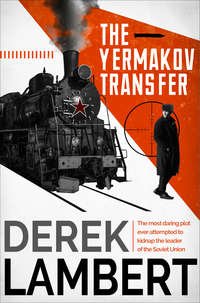
Полная версия
The Judas Code
Canaris shivered despite the heavy leather overcoat he wore. He felt cold. But then he always felt cold. From a silver pillbox he took a white tablet to aid his circulation.
He opened the door to the adjoining room and told the two shirt-sleeved inquisitors to put down their rubber hoses.
The Englishman who had been propped against a wall of the bare room slid to the floor. Just as they did in the movies, Canaris thought. Although unlike movie interrogators the two sweating Gestapo bully-boys did not appear to have been enjoying themselves. Presumably they preferred more refined and less exhausting methods of extracting information which he didn’t permit – that was the domain of Reinhard ‘Hangman’ Heydrich, Himmler’s deputy and head of all SS security, which included the Gestapo.
Perhaps one day men such as this will interrogate me, Canaris thought, and felt even colder.
He said to the Englishman: ‘Get up.’
The body on the floor moved. The bloodied head turned. Eyes slitted between swollen flesh regarded Canaris. With hatred or gratitude? With a face in that condition you couldn’t tell.
To one of the interrogators Canaris said: ‘Bring him a chair.’ When the Englishman was sitting on the kitchen chair beneath a naked electric light bulb Canaris gave him a cigarette and lit it for him.
The Englishman, whose name was Spearman, inhaled and coughed and inhaled again as if the smoke was a medicament. He was young, about twenty-three, with fair wavy hair and a face that, before the beating, had been half-saint and half-delinquent. According to Abwehr records in Lisbon he was a homosexual.
To one of the interrogators, Canaris said: ‘What was it he didn’t know? What was the question?’
‘He didn’t know whether it was true or not.’
‘Whether what was true?’
‘The information he brought, whatever that was,’ the man said sullenly.
So the Gestapo, who unfortunately handled all interrogations in Lisbon, were learning at last: don’t tell your inquisitors too much, thereby keeping risks to a minimum.
To the Englishman he said: ‘Why aren’t you fighting for your country?’
Spearman spat out blood. ‘This is a neutral country and I shall report you to the authorities.’
‘Really? What authorities, I wonder? The Portuguese? We Germans really are calling the tune here, you know, and their police won’t risk upsetting us. The British? I don’t think so, do you? They would lock you up or, worse, make you fight. But you didn’t answer my question. Why aren’t you helping to defend your country? You see I am a patriot and the reasoning of a traitor interests me.’
‘I’m not a traitor.’ The voice was slurred.
‘What are you then?’
‘A pacifist.’
‘Then you should have registered as a conscientious objector in England.’
‘I prefer the sunshine,’ Spearman said.
‘Where did you get this information?’
‘At the Casino at Estoril, where else?’
‘A hundred and one places,’ Canaris said. ‘The Aviz or the Avenida Palace, in Lisbon, the Palácio or the Hotel do Parque in Estoril …’
‘I like to gamble.’
‘Who gave you the information?’
‘I gleaned it.’
He spoke beautiful English. Perhaps he had been to Cambridge where the Russians were so assiduously recruiting agents.
‘Who from?’
Spearman put two fingers inside his mouth. They came out holding a tooth. Then the spirit seemed to go out of Spearman, so often the case when a homosexual realises his looks have been damaged.
Sensing that the moment had come to change the approach, Canaris dismissed the two Gestapo thugs. They hesitated, unsure of Canaris’s authority.
Without raising his voice, Canaris said: ‘Get out.’
They went.
Canaris sat down opposite Spearman, gave him another cigarette and said in a friendly, almost paternal, tone: ‘Come now, stop being so obstinate. An admirable quality, I agree, and very British, but entirely misplaced at the moment.’
Tears gathered in Spearman’s eyes. ‘I just don’t understand,’ he said. ‘I pass on information, that’s all. I don’t pretend it’s true, I never have. And what happens …?’ His voice trembled and he brushed at his eyes with blood-stained fingers; Canaris felt almost, but not quite, sorry for him. ‘This is what happens … It isn’t fair.’
‘If you co-operate it won’t happen again. Believe me, I don’t want to see you hurt.’ True enough. ‘And if you do help us we might even increase your reward.’
Spearman stared at Canaris beseechingly. ‘But I have co-operated; I don’t understand …’
‘Your informant, who was he?’ Canaris hardened his tone a little.
‘I told you it was only hearsay.’
‘A homosexual?’
‘Does that make it more suspect?’ a little spirit returning to him.
Canaris shook his head. ‘It makes no difference. Gossip is gossip. It’s up to us to process it.’ He handed Spearman a handkerchief. ‘Who was he?’
Spearman pressed the white silk handkerchief to his eyes. ‘Yes, he’s queer all right.’
‘Your … friend?
Spearman nodded.
‘British?’
‘Swiss.’
‘You move in exalted circles, Mr. Spearman,’ because there was no such mortal as a poor Swiss here, or anywhere else for that matter.
‘I move in influential circles.’
‘You mean, I think, that for reasons we won’t pursue you are briefly admitted to the fringe of such circles. Among the fugitive kings of Europe reigning in Estoril.’
‘And bankers and businessmen and diplomats and spies, of course. There are more spies in Estoril than whores in Piccadilly.’
‘And your friend … what is his profession?’
‘Does it matter?’
‘Oh yes,’ Canaris said, ‘it matters very much.’
‘Very well then, he’s a businessman.’
‘You’re not giving very much away, Mr. Spearman. I understood you were going to co-operate.’
‘I thought it was an unwritten law,’ Spearman said, puffing away at his cigarettes, ‘that informants weren’t obliged to give away their source of information.’
‘I just re-wrote that law.’
‘Very well, his business is cork.’
‘Along with every other businessman in Lisbon. But hardly a profitable enterprise for a Swiss. After all, they don’t produce that much wine, and none of that particularly memorable. Are you sure it’s cork, Mr Spearman?’
‘I understand he’s a middleman.’
‘Ah, but he wouldn’t be anything else, would he?’ Canaris touched his grey eyebrows, a habit of his; his wife had clipped them for him at their home on Lake Ammersee in Bavaria just before he left for Portugal; he wished profoundly that he was back there now. He unbuttoned his overcoat, leaned forward and snapped: ‘His name please.’
‘I can’t give it to you. You’ll have him beaten just as you’ve beaten me.’
‘A Swiss businessman? I doubt that, I doubt that very much,’ Canaris said. ‘British draft-dodgers, yes, we beat the hell out of them. But not Swiss businessmen. In any case we might need his cork, if cork it is, for some of our Rhine wines. He is German Swiss?’
‘No, French … Shit!’ Spearman stamped on his cigarette butt. ‘That was bloody clever.’
‘At least it narrows the field. You might as well tell me his name, I’ll find out soon enough. If you die during further interrogation,’ his voice still pleasant, man-to-man, ‘then it will merely be a process of elimination.’
Spearman began to shiver. ‘If I do, you won’t —’
‘Reveal the source of my information? Certainly not. I am an officer and a gentleman, although that may have escaped you.’
Spearman gave him a name. Cottier. Canaris stood up and began to pace the floor. Cottier? It meant nothing to him.
‘… in any case,’ Spearman was saying, ‘he only heard it indirectly at a party. You know those Estoril parties …’
‘No, I don’t,’ said Canaris, thinking of France, Belgium, Holland bleeding from the wounds of war. ‘And who was his informant, for God’s sake?’
The transfer of responsibility seemed to cheer Spearman up a little. He uttered a name which stopped Canaris in his tracks because it was the name of one of the two sources that had brought him to Lisbon.
*
Half an hour later Canaris lunched with Fritz von Claus, head of the Abwehr operation in Portugal, in his small terrace house overlooking the flea market.
He usually enjoyed himself there. It was so cramped, so full of books, so bachelor, and the schnapps was so smoky on the tongue that it reminded him of his youth when, on leave from naval college, he had planned – not conspired – breathtaking visions for the Fatherland.
To Canaris, von Claus always seemed like a professor, although he was the younger of the two (the deformity on his back, not quite a hunch, had added years to his fragile frame) and, of course, junior in rank.
By the time they were halfway through a bottle of schnapps washed down with pale beer imported from Munich the present was an unwelcome stranger to their conversation. But an intrusive one.
‘So, what do you think?’ Canaris asked.
‘About the rumours? As you say, they’re a little too thick on the ground. I wouldn’t have suggested you came to Lisbon if they hadn’t been backed up by two of our prime contacts.’
‘I’m glad you did,’ Canaris said. ‘I like it in your home. It’s a forgotten outpost of the Germany we once knew. Before—’
‘Careful,’ von Claus whispered.
‘Hey, what’s this? Spy warning spy about eavesdroppers? Are the British so alert?’ But his voice was hushed.
‘The Gestapo are, you must know that.’
His words sobered them both. Von Claus switched on the radio.
Finally Canaris said softly: ‘But they answer only to Himmler and Heydrich. I answer to Hitler. For the time being,’ he said sombrely. ‘What has it come to, Fritz, fearing your own countrymen more than the enemy?’ He tossed back a measure of schnapps. ‘But back to the business of the moment – then we can luxuriate about the past over lunch. What’s for lunch, Fritz?’
‘Frankfurters,’ said von Claus. ‘Frankfurters that spit their juice at you when you sink your teeth into them. Sauerkraut and potato salad.’
Canaris licked his lips. ‘If you eat like that every day why don’t you put on any weight?’
‘I wish I did, I have a lot of trouble getting suits to fit me,’ said von Claus who was as dapper as he was deformed. ‘But tell me, Wilhelm, if this is an elaborate disinformation operation how could it possibly benefit the British?’ He turned up the volume of the radio.
Canaris shrugged. ‘God knows. But I wouldn’t put anything past Churchill. On the face of it his strategy is logical enough: persuade us to smash Russia so that Britain and Germany can co-exist without the Bolshevik menace. I’d like to think it’s as simple as that …’
‘Except that in our world things never are? Have another drink, Wilhelm. Blast the suspicions out of that old grey head of yours.’
‘Not so old,’ Canaris said. ‘You see, what Churchill is saying to Hitler is this: “We will cause no trouble in the west, leaving you free to pursue your dream of expansion in the east.” Or more concisely: “We, the British, will allow you to go to war on only one front.”’
‘So?’
‘You don’t fool me, professor. You just want me to express your own doubts.’
‘And they are?’ smiling his pinched smile.
‘Timing, my dear Fritz, timing. Just supposing Hitler was delayed? Drawn into the Russian winter. And then just supposing Churchill didn’t keep his side of the bargain. Just supposing he attacked. Voilà. A war on two fronts.’
‘Britain isn’t strong enough to attack,’ von Claus objected.
‘She would be if the United States had by then entered the war. Timing, you see. She would be with Canada, Australia, New Zealand, South Africa, India and all the rest of her Empire beside her.’
Von Claus stood up and said loudly: ‘Come on, let’s eat and soak up some of that liquid cordite.’ As Canaris stood up he again lowered his voice to a whisper: ‘You know what I think, Wilhelm? I think it might be a good idea if Stalin was warned that the Führer intended to attack. That way there would probably be no war at all and thousands, possibly millions, of German lives would be saved.’
‘That possibility,’ said Canaris equally softly, ‘had not escaped me.’ He put his finger to his lips in a gesture that was only slightly theatrical.
*
The first of the two sources on which Canaris had decided to gauge the strength of the reports about Churchill’s new policy was a sleek, well-fed cat.
His hair, grey at the temples, was sleek; his physique, aided by Savile Row suits, was sleek; when paid compliments he purred.
He was one of the Abwehr’s most trusted agents in Lisbon and unique because he never asked for money; certainly, being a banker, he had more than enough but it was the sad experience of the accountants in Tirpitzufer that the richer the agent the more he charged. Apparently all that the banker required was recognition when Germany won the war.
Конец ознакомительного фрагмента.
Текст предоставлен ООО «ЛитРес».
Прочитайте эту книгу целиком, купив полную легальную версию на ЛитРес.
Безопасно оплатить книгу можно банковской картой Visa, MasterCard, Maestro, со счета мобильного телефона, с платежного терминала, в салоне МТС или Связной, через PayPal, WebMoney, Яндекс.Деньги, QIWI Кошелек, бонусными картами или другим удобным Вам способом.







